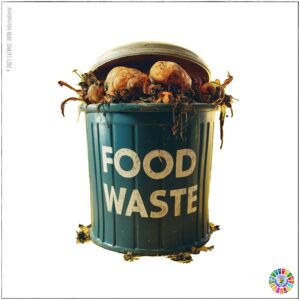FOOD WASTE – The LU’s Campaign
The Lazarus Union, a humanitarian organization with a rich history of philanthropy and social service, has recently taken a strong stance against food waste. This campaign is driven by a recognition of the multifaceted impacts of food waste on society, the environment, and the economy. This essay explores the reasons behind the Lazarus Union’s campaign against food waste, providing insights into their motivations and the broader implications of their efforts.
Addressing Food Insecurity
One of the primary motivations for the Lazarus Union’s campaign against food waste is the pressing issue of food insecurity. According to the Food and Agriculture Organization (FAO), nearly 690 million people globally are hungry, and millions more are at risk of hunger due to economic downturns, conflicts, and natural disasters. In many countries, food insecurity affects a significant portion of the population, including vulnerable groups such as children, the elderly, and low-income families.
By campaigning against food waste, the Lazarus Union aims to redirect surplus food to those in need, thereby addressing hunger and food insecurity. Initiatives such as food banks, community kitchens, and food rescue programs can benefit immensely from the redistribution of edible, yet surplus, food. This approach not only provides immediate relief to those experiencing food insecurity but also promotes a more equitable distribution of resources.
Environmental Sustainability
The environmental impact of food waste is another critical reason for the Lazarus Union’s involvement. Food waste contributes significantly to environmental degradation through the waste of resources such as water, energy, and land. Furthermore, decomposing organic waste in landfills produces methane, a potent greenhouse gas that contributes to climate change.
The Lazarus Union recognizes that reducing food waste can play a substantial role in mitigating environmental harm. By advocating for better food management practices, the organization aims to reduce the environmental footprint of food production and consumption. This includes promoting sustainable agriculture, efficient supply chains, and responsible consumer behaviors that minimize waste.
Economic Efficiency
The economic ramifications of food waste are profound. In the United States alone, approximately $218 billion worth of food is wasted annually, encompassing the resources invested in growing, processing, transporting, and disposing of uneaten food. These financial losses extend beyond households to businesses and municipalities, which incur significant costs in managing food waste.
The Lazarus Union’s campaign seeks to highlight the economic benefits of reducing food waste. For households, better meal planning, proper storage, and the creative use of leftovers can lead to substantial savings. For businesses, implementing strategies to minimize waste can enhance profitability and operational efficiency. On a larger scale, reducing food waste can alleviate the financial burden on municipal waste management systems.
Ethical Considerations
Ethical considerations are also central to the Lazarus Union’s campaign. The sheer volume of food wasted contrasts starkly with the prevalence of hunger and poverty, raising moral questions about the fairness and sustainability of current food systems. Wasting food while millions go hungry is an ethical dilemma that demands attention and action.
The Lazarus Union advocates for a more conscientious approach to food consumption and waste. This includes fostering a culture of gratitude and responsibility towards food, encouraging individuals and communities to value food and avoid waste. By promoting ethical food practices, the organization aims to cultivate a sense of stewardship and social responsibility.
Educational and Awareness Efforts
Education and awareness are pivotal components of the Lazarus Union’s campaign. Many individuals and businesses are unaware of the extent of food waste and its impacts. Through educational programs, workshops, and public awareness campaigns, the Lazarus Union seeks to inform and empower people to take action against food waste.
Educational efforts can demystify food date labels, teach practical skills for reducing waste, and highlight the benefits of composting and other waste-reduction strategies. By raising awareness, the Lazarus Union aims to inspire a collective movement towards more sustainable food practices.
Advocacy for Policy Change
In addition to grassroots initiatives, the Lazarus Union is committed to advocating for policy changes that address food waste. This includes supporting legislation that encourages food donation, standardizes date labeling, and invests in infrastructure to reduce waste along the supply chain.
Policy advocacy can create systemic changes that amplify the impact of individual and community efforts. By working with policymakers, the Lazarus Union aims to create an enabling environment for food waste reduction and to ensure that sustainable practices are supported and incentivized.
Collaboration and Partnerships
The Lazarus Union recognizes that addressing food waste requires collaboration across sectors. The organization works with a diverse range of partners, including governments, businesses, non-profits, and community groups, to leverage resources and expertise. Through partnerships, the Lazarus Union can amplify its impact and create a more coordinated and effective response to food waste.
Conclusion
The Lazarus Union’s campaign against food waste is driven by a multifaceted understanding of the issue’s impacts on food insecurity, environmental sustainability, economic efficiency, and ethical responsibility. By addressing food waste, the organization aims to alleviate hunger, reduce environmental harm, save financial resources, and promote ethical food practices. Through education, advocacy, and collaboration, the Lazarus Union is working to create a more sustainable and equitable food system. Their efforts highlight the importance of collective action in tackling one of the most pressing challenges of our time.




